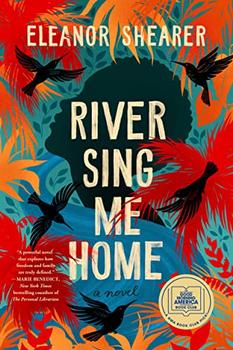Summary | Excerpt | Reading Guide | Reviews | Beyond the Book | Readalikes | Genres & Themes | Author Bio

Excerpt
River Sing Me Home
The soil on the island was fertile, but everything laid down shallow roots. When the hurricanes came, they ripped up even the sturdiest trees; and when the white men came, they tore children out of their mothers' arms. And so, we learned to live without hope. For us, loss was the only thing that was certain.
Many of us had already lost one home. A home of deep roots and of ancestors delved down into history. Those roots did not save us. Those roots rotted in the hulls of the slave ships, in darkness and filth. We had little left to plant in the new world, and whatever we had was the white men's for the taking. So we tried to live only on the island's surface. We planted cane, but nothing of our own. Mothers turned their heads when a baby was born, refusing to meet its eyes.
We tried to glide through this half-life, this life without history or future, but our endless present had ways of stretching itself out, lying across time, until our lives had movement and color again. At night, we whispered stories to the children of old gods in our homelands, in a tongue the white men couldn't understand.
Still the hurricanes came. Still the children were taken away and sold across the sea. But they were sold with a little seed inside them that sang to them of another life.
Everything laid down shallow roots. But what couldn't go deep went wide, tapping the oceans, tunneling to the islands nearby, where others were also trying and failing to live without memory of yesterday or thought of tomorrow.
Without roots, things die. Many of us did die, at the hands of the white men or in the heat of the midday sun. The soil ran rich with our blood, and the roots fed on our bodies. It made the roots strong. Shallow, but strong.
There was hope for this new world, after all.
Barbados
August
1834
1
It was the blackest part of the night and Rachel was running. Branches tore at her skin. Birds, screeching, took flight at the pounding of her strides. The ground was muddy and uneven, slick with the residue of recent rains, and she slipped, falling hard against the rough bark of a palm tree. She slid down to the soil, to where ants marched and beetles scurried and unseen worms burrowed through the earth. With ragged breaths she gulped the heavy, humid air into her lungs. She could taste its dampness on her tongue, tinged with the acidic bite of her own fear.
What had she done?
She looked behind her. Looming in the darkness was the outline of the mill on Providence plantation, its arms splayed out like four sharp-edged daggers marking an angry cross into the sky. Terror clawed at her throat, as if the mill itself had eyes and could whisper to the overseer what it had seen.
It was not too late. She could still climb back over the wall and creep through the fields of half-planted cane, where gaping holes awaited young green stalks. She could return to her hut, one wooden square among many, and lie back on the sleeping mat that was worn thin from forty years of use. She could wait for dawn and another day of labor ...
Scrambling to her feet, she kept running. Her legs plunged her deeper into the half-formed shadows of the forest.
Her chest ached. She wanted to collapse but could not; her body, unbidden, carried her farther and farther away from Providence. Every snap of a twig sounded like a gunshot; the murmuring of cane toads became the distant cries of searching men. She must keep running.
Alone, mud-streaked, with weariness sinking into her very bones, a question haunted her-
Was this freedom?
The empty forest. Her fleeing, sick with dread. Was this what they had hoped for, all along?
The day before, all the slaves of Providence had gathered outside the great house. A stone-faced set of white people waited for them—the master, on horseback, flanked by the overseer, with the master's wife and three children standing on the steps of the house. The white people stared at the slaves. The slaves stared back.
Excerpted from River Sing Me Home by Eleanor Shearer. Copyright © 2023 by Eleanor Shearer. All rights reserved. No part of this excerpt may be reproduced or reprinted without permission in writing from the publisher.
Your guide toexceptional books
BookBrowse seeks out and recommends the best in contemporary fiction and nonfiction—books that not only engage and entertain but also deepen our understanding of ourselves and the world around us.